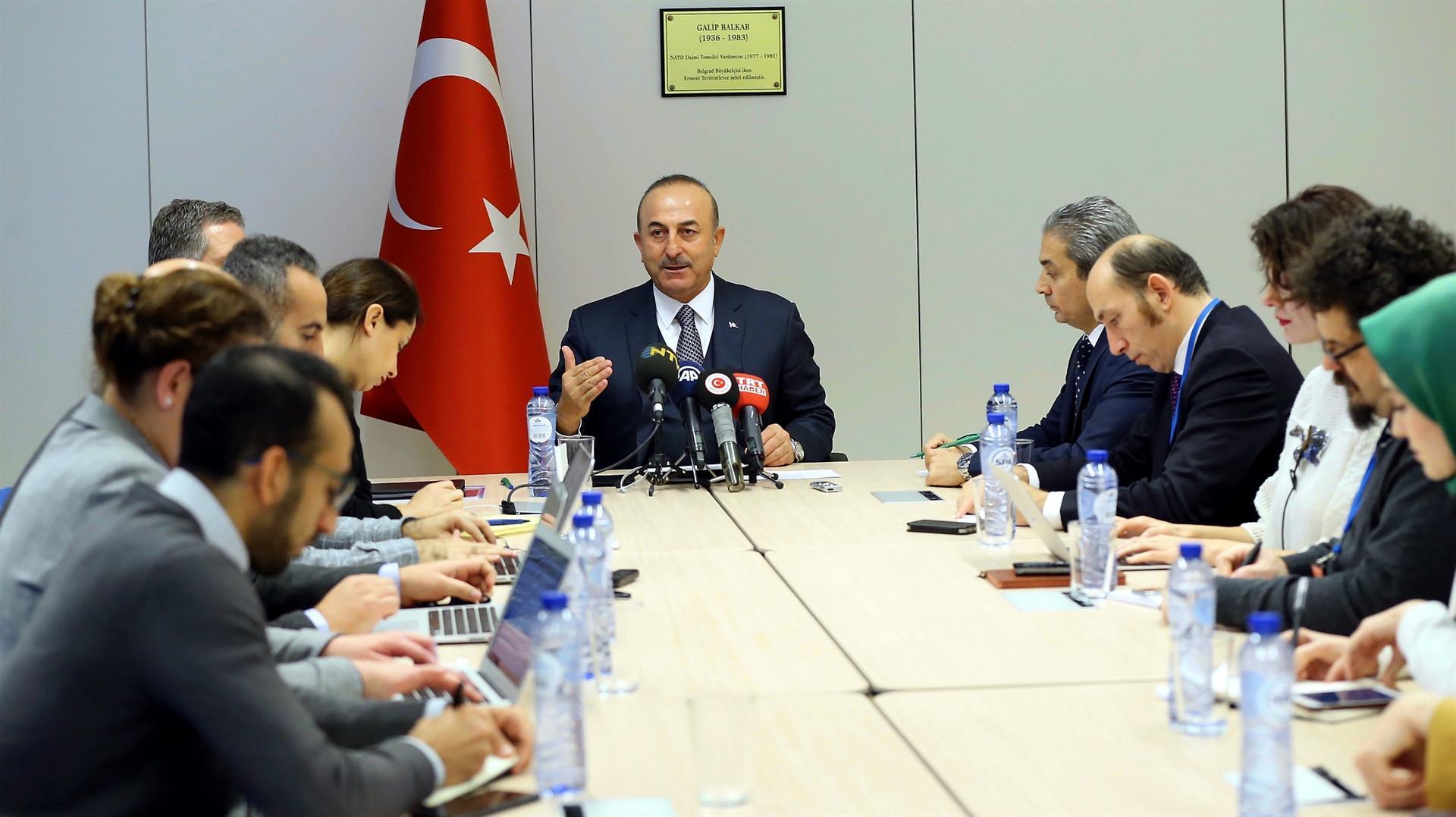
Any progress in efforts to resolve the Syrian crisis was achieved thanks to the Astana and Sochi processes while the Geneva process was in a stalemate, Turkish Foreign Minister Mevlüt Çavuşoğlu said on Dec. 5, noting that remarks made by a U.S. envoy undermining the Astana process was “unfortunate.”
“It is a wrongful statement. The statement by Jeffrey is unfortunate. I don’t think those were his own thoughts,” Çavuşoğlu told a group of journalists, elaborating on the U.S. envoy for Syria James Jeffrey’s suggestion to end the Astana talks on Syria.
“If the cease-fire in Syria is still preserved, even despite the violations, if today we can still talk about a political process, if we can discuss the constitutional committee… they have been achieved thanks to the Astana process and Sochi [talks],” he said.
“Turkey never allowed Astana and Sochi to become alternatives to the Geneva process; international legitimacy is very crucial,” he said. “But nothing happened in Geneva, no steps were taken [in Geneva] on the issues I referred to, not even a real meeting,” he added.
“If we have been able to come to this point, it was thanks to this process,” Çavuşoğlu said, noting that efforts should be made for a contribution similar to the four-way summit of Turkey, Russia, France and Germany, instead of trying to isolate the Astana process, the minister said.
Turkey and Russia would not have been able to make a deal to circumvent an operation into Syria’s rebel-held Idlib if the Astana process was not maintained, he added.
“The U.S. view is ‘let’s pull the plug on Astana,’” Jeffrey had said at a briefing in Washington on Dec. 3, claiming that the Astana process guarantors — Russia, Turkey, and Iran — have failed to advance efforts for a Syrian constitutional committee.
Jeffrey said the U.S. would propose ending the competitor to the Geneva talks when U.N. Syria envoy Staffan de Mistura departs his seat at the end of the year.
Turkey, US to hold working group for east of Euphrates
Jeffrey will be visiting Turkey for a joint working group meeting on Dec. 7 during which the issue of the presence of the YPG in the east of River Euphrates will be discussed, the minister noted.
Ankara considers the YPG as the Syrian offshoot of the PKK, which it deems a terrorist organization together with the U.S. and the EU.
“For stability there, first of all, the terrorist groups should be eliminated,” Çavuşoğlu said.
The joint working group will convene in Ankara to discuss “what will be done in the east of Euphrates,” he added, stressing that the last paragraph in a road map drawn for Manbij envisages that as long as the Manbij part of the road map is finalized, it will also be applied to the east of the Euphrates and the other regions of Syria in the north to maintain stability there.
Turkey and the U.S. will make efforts together in order to hand over the administration of those areas to the locals of the region, according to the Turkish foreign minister.
Elaborating on a possible meeting between the Russian, Turkish, German and French leaders on the issue of Syria, the minister said such a gathering could convene when needed, but no date has been scheduled yet.
“We agreed both with [Turkish President Recep Tayyip] Erdoğan and [German Chancellor Angela] Merkel that when it is necessary, one more forum can be convened with the participation of [Russian President Vladimir] Putin, Erdoğan, Merkel and [French President Emmanuel] Macron,” Russian presidential aide Yury Ushakov said on Dec. 5.
Russia, Turkey, Iran to hold next round of Syria talks: Kazakh FM

The consensus was reached during separate meetings of Putin with Erdoğan and Merkel on the sidelines of the G20 Summit in Argentina’s capital Buenos Aires, Ushakov said.
The place of a new meeting will be defined when the date is set, according to the aide. On Oct. 27, Istanbul hosted the first ever quadrilateral summit on Syria. The Turkish, Russian, French and German leaders examined the situation in the country and offered a plan for the crisis resolution.
Ankara sees no problem with delivery of F-35 jets
Turkey sees no issue in procuring the Lockheed Martin jets despite efforts in the U.S. Congress to block the sale and U.S. President Donald Trump telling Erdoğan that he didn’t want any problems with the sale of the F-35 fighter jets to Ankara, Çavuşoğu said.
On the sidelines of the G-20 Summit in Argentina, the U.S. president opened a conversation on the issue of the F-35 fighter jets and asked “if there is any problem,” the minister noted.
The U.S. “wants to deliver” the fighter jets “without any problems” because Turkey is “not only a purchaser but also part of the production phase and an important partner,” Trump told Erdoğan during talks, according to the minister.
Cancelling this project is not easy, the minister said. “It has economic and political dimensions along with reflections on our relations. Therefore, we don’t see a problem at the moment,” he added.
The U.S. Senate has demanded blocking the sales of the jets to Turkey unless Trump certifies that Turkey is not threatening NATO, purchasing defense equipment from Russia or detaining U.S. citizens.